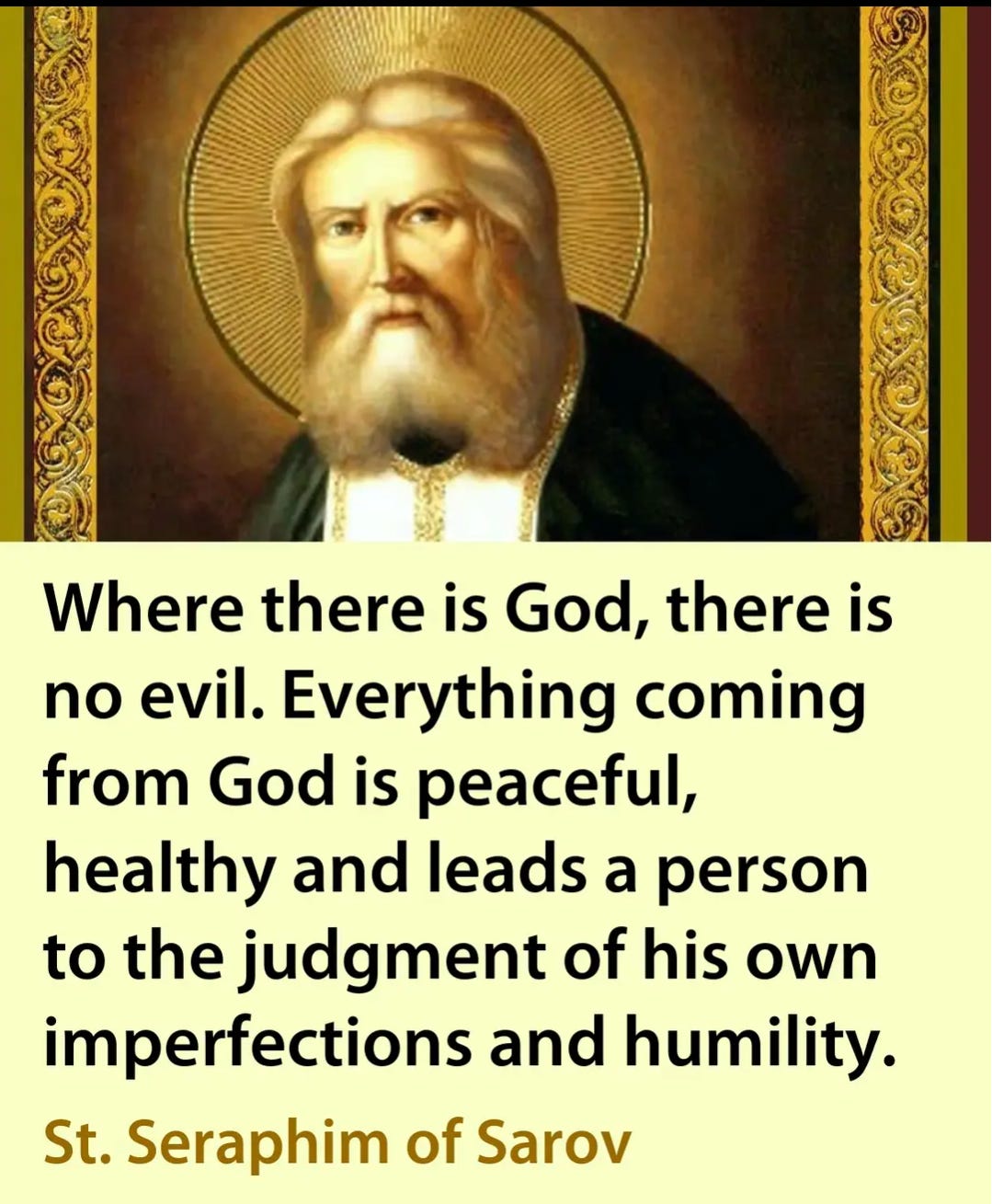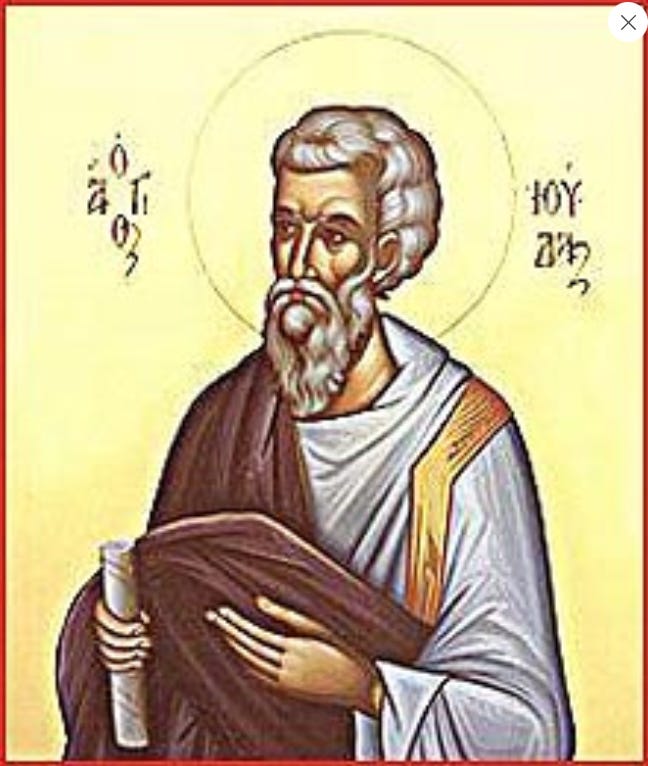Jude 1-10 (Vespers, 1st reading)
1 Jude, a bondservant of Jesus Christ, and brother of James, to those who are called, sanctified by God the Father, and preserved in Jesus Christ:
2 Mercy, peace, and love be multiplied to you.
3 Beloved, while I was very diligent to write to you concerning our common salvation, I found it necessary to write to you exhorting you to contend earnestly for the faith which was once for all delivered to the saints.
4 For certain men have crept in unnoticed, who long ago were marked out for this condemnation, ungodly men, who turn the grace of our God into lewdness and deny the only Lord God and our Lord Jesus Christ.
5 But I want to remind you, though you once knew this, that the Lord, having saved the people out of the land of Egypt, afterward destroyed those who did not believe.
6 And the angels who did not keep their proper domain, but left their own abode, He has reserved in everlasting chains under darkness for the judgment of the great day;
7 as Sodom and Gomorrah, and the cities around them in a similar manner to these, having given themselves over to sexual immorality and gone after strange flesh, are set forth as an example, suffering the vengeance of eternal fire.
8 Likewise also these dreamers defile the flesh, reject authority, and speak evil of dignitaries.
9 Yet Michael the archangel, in contending with the devil, when he disputed about the body of Moses, dared not bring against him a reviling accusation, but said, “The Lord rebuke you!”
10 But these speak evil of whatever they do not know; and whatever they know naturally, like brute beasts, in these things they corrupt themselves.
John 14:21-24 (Gospel, Apostle)
21 He who has My commandments and keeps them, it is he who loves Me. And he who loves Me will be loved by My Father, and I will love him and manifest Myself to him.”
22 Judas (not Iscariot) said to Him, “Lord, how is it that You will manifest Yourself to us, and not to the world?”
23 Jesus answered and said to him, “If anyone loves Me, he will keep My word; and My Father will love him, and We will come to him and make Our home with him.
24 He who does not love Me does not keep My words; and the word which you hear is not Mine but the Father’s who sent Me.
Apostle Jude the Brother of the Lord
The Holy Apostle Jude, one of the twelve apostles of Christ, is descended from King David and Solomon, and was the son of Righteous Joseph the Betrothed (Sunday after the Nativity of the Lord) by his first wife.
The Holy Apostle John the Theologian writes in his Gospel, “... neither did his brethren believe in Him” (John. 7:5). Saint Theophylact, Archbishop of Bulgaria, explains this passage. He says that at the beginning of the Lord Jesus Christ’s earthly ministry, Joseph’s sons, Jude among them, did not believe in His divine nature. Tradition says that when Saint Joseph returned from Egypt, he began to divide his possessions among his sons. He wanted to allot a share to Christ the Savior, born miraculously and incorruptibly from the All-Pure Virgin Mary. The brothers were opposed to this because Jesus was born of another mother. Only James, later called “The Brother of God,” offered to share his portion with Him.
Jude came to believe in Christ the Savior as the awaited Messiah, and he followed Him and was chosen as one of the twelve Apostles. Mindful of his sin, the Apostle Jude considered himself unworthy to be called the Lord’s brother, and in his Epistle he calls himself merely the brother of James.
The Holy Apostle Jude also had other names: the Evangelist Matthew terms him “Lebbaeus, whose surname was Thaddeus” (Mt. 10:3). The Holy Evangelist Mark also calls him Thaddeus (Mark 3:18), and in the Acts of the Holy Apostles he is called Barsabas (Acts 15: 22). This was customary at that time.
After the Ascension of the Lord Jesus Christ, Saint Jude traveled about preaching the Gospel. He propagated the faith in Christ at first in Judea, Galilee, Samaria and Idumaia, and later in the lands of Arabia, Syria and Mesopotamia. Finally, he went to the city of Edessa. Here he finished the work that was not completed by his predecessor, Saint Thaddeus, Apostle of the Seventy (August 21). There is a tradition that Saint Jude went to Persia, where he wrote his catholic Epistle in Greek. In the Epistle much profound truth was expressed in a few words.
Saint Jude’s Epistle speaks about the Holy Trinity, about the Incarnation of the Lord Jesus Christ, about the good and bad angels, and about the dread Last Judgment. The Apostle urges believers to guard themselves against fleshly impurity, to be diligent in prayer, faith and love, to convert the lost to the path of salvation, and to guard themselves from the teachings of heretics. He also says that it is not enough just to be converted to Christianity, but faith must be demonstrated by good works. He cites the rebellious angels and men punished by God (verse 6) to support this.
The Holy Apostle Jude died as a martyr around the year 80 near Mt. Ararat in Armenia, where he was crucified and pierced by arrows.
The Fast of the Holy Apostles
Nikolaos Georgantonis, Theologian
In our spiritual life, fasting isn’t an end in itself, but a tool that helps to cleanse us and transform our passions so that we can reach the kingdom of God. Among the fasts instituted by the Church is that of the Holy Apostles, which, unfortunately, many Christians are unaware of. On June 29, the Church celebrates the feast of the chief among the apostles, Peter and Paul. As a commemoration of the death by martyrdom of the two apostles, it ordained this fast, which, with the New Calendar, never exceeds thirty days in length.
The fast begins on the Monday after the Sunday of All Souls and ends on 29 June. It’s a moveable feast and its length depends on the date of Easter. According to Athanasios the Great (4th c.), the fast begins after Pentecost because that’s when the apostles began their mission. According to the Apostolic Constitutions, it began then after the Sunday of All Saints, as it still does today. In this fast, fish, oil and wine are allowed. On 29 June, when the fast ends, on that day, fish is allowed for monastics and there are no restrictions for the laity.
Attempts have been made to reduce the length of the fast, or to give a dispensation for more categories of food, as was the case under Ecumenical Patriarch Ieremias III (1719). He tried to limit the fast to 12 days, since in Fanari (‘the Phanar’), it had been abolished. This effort failed, however, since the fishermen and grocers rebelled because they lost business during the fast [and, presumably, wanted it to be abolished altogether]*. Another attempt was made, during the reign of Patriarch Ioakeim III (1901-1912), to allow the consumption of eggs, milk and cheese during the fast. This effort also failed, however, this time because of stiff resistance from the monks of the Holy Mountain.
There’s something basic that we should all be aware of. The fasts of the Church can’t be modified to suit our whims. Instead, we should adapt to these fasts as the holy Church has ordained them. Of course, there’s always ‘dispensation’ which can be given by exception, at the discretion of one’s spiritual guide, to assist in the recovery of any believer who is ill. Since we’re all sick to a greater or lesser extent, spiritually or bodily, the Church acts as a ‘nurse’ to assist all of us, depending on the degree of our ailment. But we must all follow the general guidelines of the Church and not look at the exception, at ‘dispensation’, as an easy answer. On the instructions of our spiritual guide, we should fight for what’s best for our soul.
I hope that none of us discounts this important fast of our Church and that we can use it appropriately for the cure of our souls. Have a good fast.
* It’s understandable that the grocers might be annoyed, since it would have meant a reduction of sales of milk, cheese and eggs, but it’s hard to understand how the fishermen would have been affected, given that fish is allowed. Fish was a very important source of protein for the population of the city, since meat was a rarity. And it was super-abundant in Constantinople, with shoals in all shapes and sizes swimming in one direction in the morning and then returning in the evening, almost begging to be caught. Indeed, being a fisherman in Constantinople in those days must have been one of the easiest ways of making a living known to man [WJL].
This week’s calendar reminders:
Monday 6/16: Matins 8:30 a.m.; Stewards Meeting 6:30 p.m.; Apostles Fast Begins
Tuesday 6/17: no services or events
Wednesday 6/18: no services or events
Thursday 6/19: Matins 8:30 a.m.; FORCC Meeting at CTS 6:30 p.m.
Friday 6/20: Matins 8:30 a.m.
Saturday 6/21: Catechumen Class 4:30 p.m.; Choir Practice 5 p.m.; Great Vespers 6 p.m.
Sunday 6/22: Hours & Divine Liturgy 9:15 a.m.
CLICK BELOW to donate online:
Christ the Savior Orthodox Church is located in Southbury, Connecticut, and is part of the New England Diocese of the Orthodox Church of America.
Mailing address: Christ the Savior Church, 1070 Roxbury Road, Southbury, CT 06488
PLEASE DONATE to help our parish do the work of the Lord, thrive and grow, and extend the Kingdom of God. May the Lord bless your generosity!
Fr. Moses Locke can be reached at frmoseslocke@gmail.com











